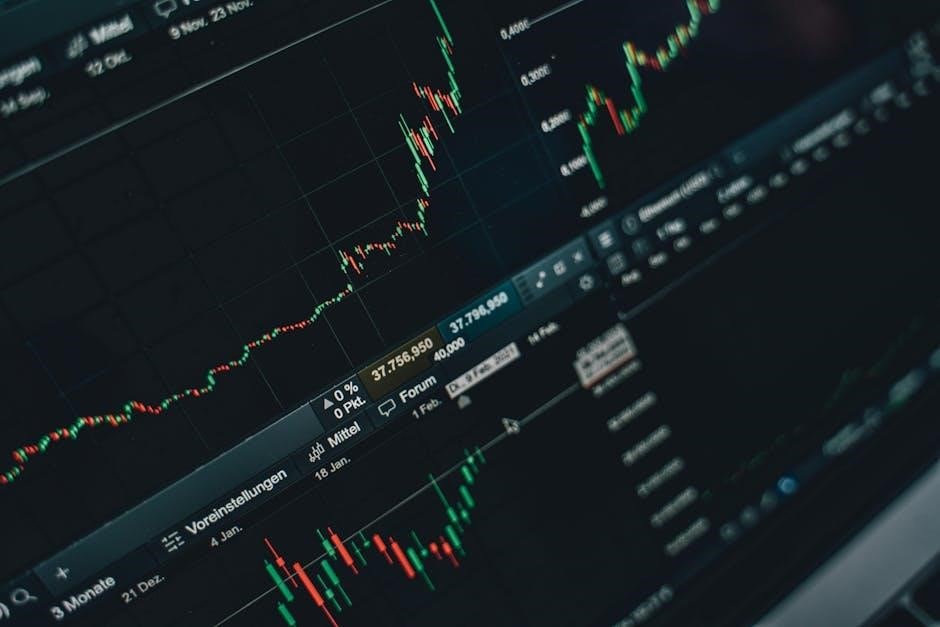Option Greeks are essential concepts in options trading, measuring sensitivity to price, volatility, and time. They guide strategic decisions, helping traders predict price movements and manage risks effectively.
What Are Option Greeks?
Option Greeks are financial metrics that measure the sensitivity of an option’s price to various factors. The primary Greeks include Delta, Gamma, Theta, Vega, and Rho. Delta measures the option’s price sensitivity to changes in the underlying asset’s price. Gamma measures the rate of change of Delta, indicating how Delta evolves as the asset price moves. Theta reflects the impact of time decay on the option’s value, while Vega measures sensitivity to volatility changes. Rho, though less commonly used, assesses the effect of interest rate fluctuations. Together, these metrics provide traders with insights into how different factors influence option prices, enabling better risk management and strategic decision-making in options trading.
Why Are Greeks Important in Trading?
Option Greeks are crucial for traders as they provide insights into how various factors influence option prices. Delta, Gamma, Theta, Vega, and Rho help traders understand sensitivity to price changes, time decay, volatility, and interest rates. By analyzing these metrics, traders can assess potential risks and opportunities, enabling smarter decision-making. Greeks also aid in hedging strategies, allowing traders to balance portfolio exposure. They are essential for predicting price movements and adjusting positions accordingly. Understanding Greeks helps traders manage risk effectively, optimize returns, and execute complex strategies with confidence. This makes them indispensable tools for both novice and experienced traders aiming to refine their options trading approaches.
Understanding the Option Greeks

The Greeks are essential metrics for assessing how various factors influence option pricing, enabling traders to manage risks and implement effective trading strategies successfully.
Delta: Measuring Price Sensitivity
Delta is a critical measure of an option’s price sensitivity to changes in the underlying asset’s price. It indicates how much the option’s value will change for a $1 movement in the asset. A positive Delta for call options means the option gains value as the asset price rises, while a negative Delta for put options reflects a decline in value with rising asset prices. Traders use Delta to assess potential profits or losses and to hedge positions effectively. For example, a Delta of 0.5 means the option’s price is expected to increase by $0.50 for every $1 rise in the underlying asset. Delta-neutral strategies aim to balance Delta to minimize directional market risk, making it a cornerstone in options trading and portfolio management.
Gamma: The Rate of Change of Delta
Gamma measures the rate at which an option’s Delta changes as the underlying asset’s price fluctuates. It represents the convexity of the option’s value, indicating how sensitive Delta is to price movements. A high Gamma means Delta will change significantly with small price shifts, while a low Gamma implies a more stable Delta. Gamma is crucial for traders employing Delta-neutral strategies, as it helps anticipate how hedging needs may change. For instance, options with high Gamma are more sensitive to price changes, requiring frequent rebalancing. Traders use Gamma to refine their strategies, especially in volatile markets, ensuring their positions remain aligned with market movements and minimizing unwanted exposure to price swings. Monitoring Gamma is essential for maintaining effective risk management in options trading.
Theta: Understanding Time Decay
Theta represents the rate at which an option’s value decreases as time passes, known as time decay. It quantifies how much an option loses value daily, holding all else constant. Long option positions are negatively impacted by Theta, as their value erodes over time. Conversely, short positions benefit, as the options they sold lose value. Theta is highest for at-the-money options and decreases for deep in- or out-of-the-money contracts. Traders use Theta to anticipate how time will affect their positions, especially in strategies like covered calls or calendar spreads. Managing Theta is crucial for balancing decay against potential gains, ensuring strategies remain profitable despite the relentless passage of time. Understanding Theta helps traders make informed decisions about when to hold or exit positions, optimizing their overall trading performance and risk exposure. Effective Theta management is vital for maintaining profitability in options trading.

Vega: Measuring Volatility Sensitivity
Vega measures an option’s sensitivity to changes in implied volatility, a critical factor in options pricing. It quantifies how much an option’s value will change for a 1% shift in volatility. High Vega values indicate greater responsiveness to volatility fluctuations, while low Vega suggests minimal impact. Long option positions benefit from rising volatility (positive Vega), whereas short positions face losses. Traders use Vega to gauge potential profits or risks tied to volatility changes. Strategies like straddles or strangles rely heavily on Vega, as they capitalize on volatility spikes. Understanding Vega is essential for managing volatility risk and aligning trading strategies with market conditions. It helps traders anticipate how changes in volatility will affect their positions, enabling better decision-making and risk management in dynamic markets.
Rho: The Impact of Interest Rates
Rho measures an option’s sensitivity to changes in interest rates, indicating how much its value will shift for a 1% change in rates. Rho is generally small for stock options but more significant for options on assets with high interest rate sensitivity, like bonds or currencies. Rising interest rates typically increase call option values and decrease put option values, while the opposite occurs when rates fall; Traders use Rho to assess how interest rate fluctuations may impact their positions. While less volatile than other Greeks, Rho is crucial for strategies involving interest rate changes. It helps traders anticipate and manage risks tied to monetary policy shifts or economic trends, ensuring better alignment of their strategies with broader market conditions.

Advanced Greek-Based Trading Strategies
Advanced strategies leverage Option Greeks to optimize returns and manage risks in dynamic markets. Techniques like delta-neutral and gamma scalping use Greeks to predict price movements and maximize profitability.
Delta-Neutral Strategies
Delta-neutral strategies aim to balance the overall delta of a portfolio to zero, minimizing exposure to directional market movements. This approach combines options and underlying assets to offset potential gains or losses from price changes. By achieving delta neutrality, traders can focus on profiting from factors like time decay or volatility rather than market direction. These strategies often involve complex positions, such as simultaneous buying and selling of options with differing strike prices or expiration dates, to cancel out delta sensitivity. While delta-neutral strategies reduce directional risk, they still entail risks related to volatility (vega) and time decay (theta), requiring careful monitoring and adjustment to maintain balance and profitability.
Gamma Scalping
Gamma scalping is a sophisticated trading strategy that leverages the gamma metric to capitalize on small price movements in the underlying asset. By maintaining a delta-neutral position, traders exploit gamma by continuously adjusting their portfolio as the asset price fluctuates. This involves buying options when the price dips and selling them when it rises, profiting from the change in delta. Gamma scalping is most effective in volatile markets where frequent price swings occur. However, it requires precise timing and execution, as excessive transactions can incur high costs. Additionally, while gamma scalping can generate steady profits, it carries risks, especially if the market experiences unexpected large-scale movements. This strategy is typically employed by experienced traders who deeply understand options dynamics and market behavior.
Volatility Trading with Vega
Volatility trading with Vega is a strategy focused on exploiting changes in implied volatility, a key driver of option prices. Vega measures an option’s sensitivity to volatility fluctuations, making it a critical tool for traders. By analyzing Vega, traders can identify opportunities in volatile markets or hedge against potential losses. Strategies include buying options with high Vega in anticipation of increased volatility or selling them when volatility is expected to decline. Volatility trading requires a deep understanding of market conditions and timing. While it offers significant profit potential, it also carries risks, as volatility can be unpredictable. Effective use of Vega helps traders navigate these risks and make informed decisions to maximize returns in dynamic market environments.

Case Studies and Examples
Real-world applications of Greek strategies demonstrate practical uses of Delta, Gamma, and Vega in managing risks and maximizing returns through diverse trading scenarios and market conditions effectively.
Real-World Applications of Greek Strategies
Option Greeks are widely applied in portfolio risk management and trading strategies. For instance, Delta and Gamma are used to hedge positions effectively, while Theta helps traders manage time decay. Vega is crucial for volatility trading, and Rho accounts for interest rate changes. These metrics allow traders to adjust strategies dynamically, ensuring alignment with market conditions. Practical examples include delta-neutral strategies, gamma scalping, and volatility trading. Traders can optimize returns by balancing Greeks, such as offsetting negative Theta with positive Vega. Real-world case studies demonstrate how combining Greeks enhances profitability and reduces risk, making them indispensable tools for sophisticated investors and portfolio managers. These applications highlight the practical value of Greeks in executing successful trading strategies across various market scenarios.
